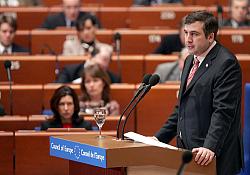
GEORGIAN PRESIDENT LAUNCHES SOUTH OSSETIA PEACE INITIATIVE
Publication: Eurasia Daily Monitor Volume: 2 Issue: 19
By:

Addressing the Parliamentary Assembly of the Council of Europe (PACE) in Strasbourg on January 26, Georgian President Mikheil Saakashvili unveiled an offer of full autonomy for South Ossetia. Under this offer, South Ossetia would enjoy — both de facto and de jure — a higher level of self-governance within Georgia, compared to that of North Ossetia within Russia. Although Saakashvili stopped short of defining the proposed status as a “republic,” this is actually the concept under discussion in Tbilisi and with the Council of Europe’s Commission for Democracy through Law (the Venice Commission).
Under the offer, South Ossetia’s population would freely and directly elect a legislative assembly and an executive branch of government. Their competencies would include: tax collection and formation of the region’s budget, local administration, public order, economic and social policy, culture, and education. The Ossetian language would enjoy official status, with guarantees for its use in local media, local administration, and schools. South Ossetia would be authorized to conclude trade agreements with North Ossetia in Russia, and residents would be eligible for simplified regulations for cross-border travel.
South Ossetia would be entitled to senior posts in Georgia’s government ministries, seats on the high courts, and a numerical quota of seats in Georgia’s parliament. As the region’s ethnic Ossetian residents form barely 1% of Georgia’s total population, Saakashvili’s address emphasized the need to preserve and promote the Ossetian ethnic-linguistic identity in Georgia. This reflects the government’s policy, designed to increase Georgia’s attractiveness to South Ossetians, and contrasting with the situation in Russia, where North Ossetians are largely Russified and lack native-language schools.
A three-year transitional period is envisaged for the integration of South Ossetian military forces with those of Georgia, under oversight of “international organizations” [not countries]. This wording seems designed to avoid disruption by Russia, which has armed and trained South Ossetia’s forces and staffed them in part with North Ossetians.
In his speech, Saakashvili appealed to South Ossetian refugees to return, at Georgia’s expense, and to European countries to share with Georgia the costs of post-conflict reconstruction and the mass repatriation of refugees. His plan envisages legislation on the right of return, on property restitution, and other forms of compensation to victims of the conflict. The government would pay compensation in the form of annuities. It also provides for the establishment of a conciliation commission, empowered to deal with allegations of crimes against the population and to ascertain the responsibilities for such crimes.
In September 2004 the Georgian government launched a program to facilitate the return of South Ossetian refugees from North Ossetia. This program, and now Saakashvili’s offer, is the first — and thus far the sole — offer by any Caucasus country to welcome a displaced population back to its homes. Most of these refugees had lived dispersed among Georgians in villages outside South Ossetia, prior to the 1989-92 conflict. As Saakashvili intimated, European Union assistance for infrastructure rebuilding and development in this small corner of Georgia would yield major political benefits in terms of regional stabilization.
Saakashvili called on the Council of Europe to become involved as “facilitator” in the negotiations, the OSCE to continue as “peace monitor,” and the European Union to become the “peace guarantor” of the settlement. He strongly appealed to an EU widely seen as deficient in the region, though widely expected to lead: “It is time for the EU to take an active role in the region. The EU, which is coming closer and closer to our borders, can no longer afford to have these black holes next door. Now is the time for the EU to exercise leadership and demonstrate a consolidated European foreign policy and conflict-resolution policy.” He mentioned the United States and Russia in passing as “peace partners” [not further specified] to Georgia.
Otherwise Saakashvili did not mention Russia, whether for assigning blame or for inviting its mediation and guarantees. The former would have been undiplomatic in this context; the latter, should it come to pass, would carry the risk of nipping the peace initiative in the bud.
The speech provided merely an outline of the detailed proposals that the Georgian government has prepared as a basis for negotiations. Not addressed in the public version of the speech were the issues of citizenship, border protection, and the status of Georgians who form nearly one-third of South Ossetia’s population.
The PACE session received the initiative favorably. In Moscow, South Ossetian leader Eduard Kokoiti rejected it on the same day.
(Imedi Television, Rustavi-2 TV, Kavkasia-Press, January 26).




